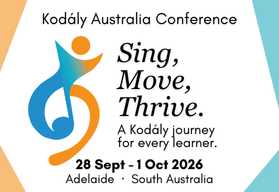The Kodály Concept
The Kodály (click here for the correct pronunciation) concept was inspired by the philosophies of the Hungarian composer and educator, Zoltan Kodály (1882 – 1967). Throughout Kodály’s writings are the notions that a person cannot be complete without music and that music serves to develop a person on all levels – emotionally, spiritually and intellectually.
Kodály believed that every person has musical aptitude and that, ideally, a music education should begin as early as possible in a person’s life – firstly at home and then later within the school curriculum.
Kodály believed that singing should be the foundation of all music education.
“It is a long accepted truth that singing provides the best start to music education; moreover, children should learn to read music before they are provided with any instrument…even the most talented artist can never overcome the disadvantages of an education without singing” (Kodaly, 1974).
The use of the voice is one of the most defining features of the Kodály approach. The voice is the most accessible of all instruments and this makes it most suitable for musical instruction and can lead to a highly developed musical ear. By focusing on learning through engaging with music, singing, playing, moving and enjoying, music becomes part of the natural learning process.
Developmental, Sequential, Cumulative and Continuous Music Education
Kodály believed that musical instruction should reflect the way that children learn naturally. Through singing games, fun and play the child discovers the musical elements as they are presented sequentially and has the opportunity to enter the world of music through the creative development of the ear and the eye.
The Kodály Concept within the Australian Context
Since its introduction into the Australian context the influence of the Kodály concept has been significant in the areas of early childhood, primary and secondary education. Research and training have underpinned endeavours in the ACT, NSW, Queensland, Victoria, South Australia and Western Australia and have encouraged many teachers to strive for a better musical future for their students.
Kodály, Z. (1974). The Selected Writings of Zoltán Kodály. London: Boosey & Hawkes.
The Kodály Concept
Latest News
Happy New Year!
As we near the end of 2025, I extend my warmest wishes on behalf of Kodály Australia for a positive and fulfilling year ahead. Supporting our community is at the heart of our work, and this year our members have benefited from an extensive offering …
Read more
Congratulations Susie Fredline (Qld) & Dr James Cuskelly (Qld)
I write to acknowledge and celebrate two members of our community. Susie Fredline – Honorary Life Membership of Kodály Australia Congratulations to Susie Fredline (Qld), who was awarded Honorary Life Membership of Kodály Australia earlier this year. Honorary Life Membership is Kodály Australia’s highest accolade and …
Read more
NEW Member Resources
I am pleased to announce the launch of a refreshed Kodály Australia Member Portal. All members of Kodály Australia may now use the Member Portal to access an online repository of resources and professional learning. To access these resources, please explore the branch …
Read more
ASME XXV National Conference 2025
The Australian Society for Music Education (ASME) XXV National Conference will be held from September 26 to 29, 2025, at the Queensland Conservatorium, Griffith University. The call for paper and workshop presentations has been extended until this Friday, 14 February 2025. As …
Read more
Season’s Greetings from Kodály Australia
As we near the end of 2024, I extend my warmest wishes on behalf of Kodály Australia for a joyful festive season and new year ahead. This year, there has been an extensive offering of professional learning activities provided for …
Read more



